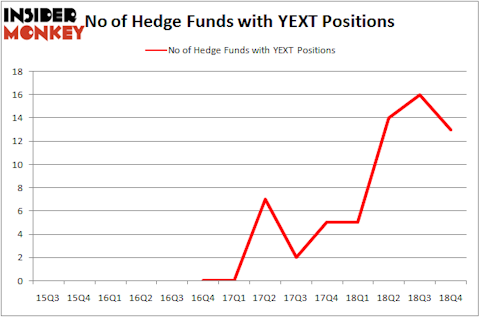The fourth quarter was a rough one for most investors, as fears of a rising interest rate environment in the U.S, a trade war with China, and a more or less stagnant Europe, weighed heavily on the minds of investors. Both the S&P 500 and Russell 2000 sank as a result, with the Russell 2000, which is composed of smaller companies, being hit especially hard. This was primarily due to hedge funds, which are big supporters of small-cap stocks, pulling some of their capital out of the volatile markets during this time. Let’s look at how this market volatility affected the sentiment of hedge funds towards Yext, Inc. (NYSE:YEXT), and what that likely means for the prospects of the company and its stock.
Yext, Inc. (NYSE:YEXT) was in 13 hedge funds’ portfolios at the end of the fourth quarter of 2018. YEXT investors should pay attention to a decrease in hedge fund interest lately. There were 16 hedge funds in our database with YEXT holdings at the end of the previous quarter. Our calculations also showed that YEXT isn’t among the 30 most popular stocks among hedge funds.
So, why do we pay attention to hedge fund sentiment before making any investment decisions? Our research has shown that hedge funds’ small-cap stock picks managed to beat the market by double digits annually between 1999 and 2016, but the margin of outperformance has been declining in recent years. Nevertheless, we were still able to identify in advance a select group of hedge fund holdings that outperformed the market by 32 percentage points since May 2014 through March 12, 2019 (see the details here). We were also able to identify in advance a select group of hedge fund holdings that underperformed the market by 10 percentage points annually between 2006 and 2017. Interestingly the margin of underperformance of these stocks has been increasing in recent years. Investors who are long the market and short these stocks would have returned more than 27% annually between 2015 and 2017. We have been tracking and sharing the list of these stocks since February 2017 in our quarterly newsletter. Even if you aren’t comfortable with shorting stocks, you should at least avoid initiating long positions in our short portfolio.
We’re going to go over the key hedge fund action encompassing Yext, Inc. (NYSE:YEXT).
Hedge fund activity in Yext, Inc. (NYSE:YEXT)
At the end of the fourth quarter, a total of 13 of the hedge funds tracked by Insider Monkey held long positions in this stock, a change of -19% from the second quarter of 2018. By comparison, 5 hedge funds held shares or bullish call options in YEXT a year ago. So, let’s check out which hedge funds were among the top holders of the stock and which hedge funds were making big moves.
More specifically, Renaissance Technologies was the largest shareholder of Yext, Inc. (NYSE:YEXT), with a stake worth $39.8 million reported as of the end of December. Trailing Renaissance Technologies was D E Shaw, which amassed a stake valued at $31.7 million. Two Sigma Advisors, Shannon River Fund Management, and Whetstone Capital Advisors were also very fond of the stock, giving the stock large weights in their portfolios.
Seeing as Yext, Inc. (NYSE:YEXT) has witnessed declining sentiment from hedge fund managers, it’s safe to say that there is a sect of funds that decided to sell off their full holdings by the end of the third quarter. It’s worth mentioning that James Crichton’s Hitchwood Capital Management said goodbye to the biggest position of the 700 funds watched by Insider Monkey, comprising an estimated $23.7 million in stock. Andrew Sandler’s fund, Sandler Capital Management, also dropped its stock, about $6.8 million worth. These bearish behaviors are interesting, as aggregate hedge fund interest was cut by 3 funds by the end of the third quarter.
Let’s check out hedge fund activity in other stocks similar to Yext, Inc. (NYSE:YEXT). These stocks are National Storage Affiliates Trust (NYSE:NSA), Medifast, Inc. (NYSE:MED), Liberty Oilfield Services Inc. (NYSE:LBRT), and CRISPR Therapeutics AG (NASDAQ:CRSP). All of these stocks’ market caps are similar to YEXT’s market cap.
| Ticker | No of HFs with positions | Total Value of HF Positions (x1000) | Change in HF Position |
|---|---|---|---|
| NSA | 17 | 107661 | 0 |
| MED | 22 | 270358 | 0 |
| LBRT | 12 | 75972 | 4 |
| CRSP | 11 | 89245 | -5 |
| Average | 15.5 | 135809 | -0.25 |
View table here if you experience formatting issues.
As you can see these stocks had an average of 15.5 hedge funds with bullish positions and the average amount invested in these stocks was $136 million. That figure was $130 million in YEXT’s case. Medifast, Inc. (NYSE:MED) is the most popular stock in this table. On the other hand CRISPR Therapeutics AG (NASDAQ:CRSP) is the least popular one with only 11 bullish hedge fund positions. Yext, Inc. (NYSE:YEXT) is not the least popular stock in this group but hedge fund interest is still below average. Our calculations showed that top 15 most popular stocks) among hedge funds returned 24.2% through April 22nd and outperformed the S&P 500 ETF (SPY) by more than 7 percentage points. A small number of hedge funds were also right about betting on YEXT as the stock returned 35.5% and outperformed the market by an even larger margin.
Disclosure: None. This article was originally published at Insider Monkey.







